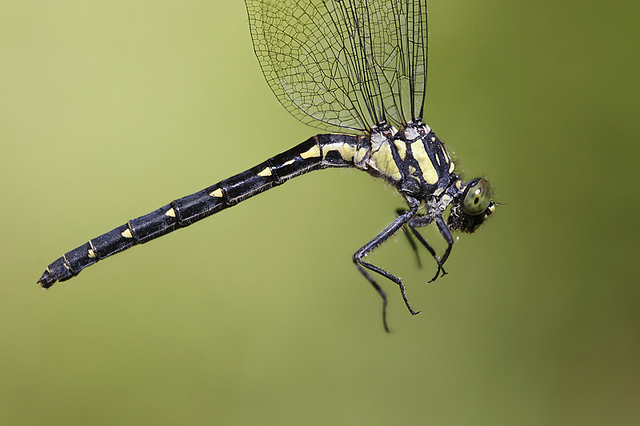Map Snapshot




16 Records
Status
The diminutive Northern Pygmy Clubtail (Lanthus parvulus) is scarcely larger than Eastern Least Clubtail, and like its congener, Southern Pygmy Clubtail (L. vernalis), it strongly prefers tiny vegetated streams and seeps to the larger waters most gomphids frequent. This northern species occurs only at higher elevations in Maryland, in Garrett and Allegany Counties (Richard Orr's The Dragonflies and Damselflies of Maryland and the District of Columbia). There is also evidently a museum specimen record from Montgomery Co. from the 1970s. L. parvulus is ranked as S2 (state rare).
Description
Northern Pygmy Clubtail has two black lateral thoracic stripes (T3-T4). Its relative, Southern Pygmy Clubtail, has only one stripe on the side of the thorax (T4) (Paulson, 2011).
Seasonality Snapshot
Source: Wikipedia
| Lanthus parvulus | |
|---|---|

| |
| male | |
| Scientific classification | |
| Domain: | Eukaryota |
| Kingdom: | Animalia |
| Phylum: | Arthropoda |
| Class: | Insecta |
| Order: | Odonata |
| Infraorder: | Anisoptera |
| Family: | Gomphidae |
| Genus: | Lanthus |
| Species: | L. parvulus
|
| Binomial name | |
| Lanthus parvulus (Selys, 1854)
| |
Lanthus parvulus, the northern pygmy clubtail, is a species of clubtail in the dragonfly family Gomphidae. It is found in North America.[2][3][1][4]
The IUCN conservation status of Lanthus parvulus is "LC", least concern, with no immediate threat to the species' survival. The population is stable. The IUCN status was reviewed in 2018.[1][5][6]

References
[edit]- ^ a b c Paulson, D.R. (2018). "Lanthus parvulus". IUCN Red List of Threatened Species. 2018: e.T51179217A65836444. doi:10.2305/IUCN.UK.2018-1.RLTS.T51179217A65836444.en. Retrieved 13 November 2021.
- ^ "Lanthus parvulus Report". Integrated Taxonomic Information System. Retrieved 2019-09-23.
- ^ "Lanthus parvulus". GBIF. Retrieved 2019-09-23.
- ^ "Lanthus parvulus species Information". BugGuide.net. Retrieved 2019-09-23.
- ^ "Odonata Central". Retrieved 2019-07-02.
- ^ "World Odonata List". Slater Museum of Natural History, University of Puget Sound. 2018. Retrieved 2019-07-02.
Further reading
[edit]- Kalkman, V. J. (2013). Studies on phylogeny and biogeography of damselflies (Odonata) with emphasis on the Argiolestidae (PhD). Leiden University. hdl:1887/22953.

